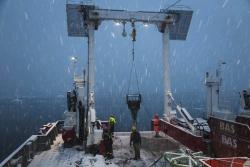Pristine Antarctic fjords contain similar levels of microplastics to open oceans near big civilisations
![]() This article by , Assistant Professor of Biology, ; , Data Interpretation Ecologist, ; , Professor of Physical Geography, , and , Senior Lecturer in Marine Geology, was originally published on . Read the .
This article by , Assistant Professor of Biology, ; , Data Interpretation Ecologist, ; , Professor of Physical Geography, , and , Senior Lecturer in Marine Geology, was originally published on . Read the .
In the middle of the last century, mass-produced, disposable plastic waste started washing up on shorelines, and to be found in the middle of the oceans. This has since become , spreading globally to even the on Earth. Just a few decades later, in the 1970s, scientists found the same problem was occurring at a much less visible, microscopic level, .
These particles of plastic are between 0.05mm and 5mm in size. Larger pieces of plastic can be broken down into microplastics but these tiny bits of plastic also come from deliberate additions to , from toothpaste to washing power.
Now, with major global sampling efforts, it that microplastics are dispersing all over the world – in the water column, sediments, and marine animal diets – even reaching as far south as the pristine environments of Antarctica.
Glacial retreat
 On board the RRS James Clark Ross. : Author providedWhile this plastic problem has become more prevalent, one of the most pristine ecosystems on Earth, the fjords of the Western Antarctic Peninsula, have been revealed by retreating glaciers.
On board the RRS James Clark Ross. : Author providedWhile this plastic problem has become more prevalent, one of the most pristine ecosystems on Earth, the fjords of the Western Antarctic Peninsula, have been revealed by retreating glaciers.
Tucked between islands and the mainland, the coast along the Western Antarctic Peninsula has long, narrow inlets created by glaciers. During the last 50 years, these fjords have physically changed, due to reduced sea ice cover and because nearly 90% of glaciers have retreated in this region. These processes have exposed the ocean floor of many of the fjords for the first time.
The potential for microplastics to impact this environment and its marine life is huge – and we’re now working to figure out the depth of the effect that microplastic pollution is having on the newly colonised habitats. Any microplastics recovered in the Southern Ocean, particularly in newly formed ecosystems, raise alarm. They not only indicate that the area has been affected, but that plastic pollution is increasingly ubiquitous too.
New habitats
In November 2017, our multidisciplinary UK-Chile-US-Canada research team – known as ICEBERGS – joined the (an ice strengthened research ship) and headed to Antarctica’s northernmost fjords. Our goal was, and still is, to gain a better understanding of how the environment and organisms evolve in newly emerging and colonising habitats in Antarctica. We are particularly interested in the marine ecosystems on the ocean floor, so have been looking at areas such as Marian Cove and Börgen Bay on the Western Antarctic Peninsula, where communities have only developed in the last few decades – due to the retreating glaciers.
Thriving marine ecosystems can act as climate regulators. When ice retreats, new, pristine fjordic habitats are revealed and phytoplankton blooms occur. These help to counteract climate change because they take carbon dioxide gas out of the atmosphere. New productive seabed habitat also becomes available for the diverse shallow water fauna that eat this algae, and store the carbon long term. Not counteracting climate change, however, is the fact that new open water absorbs heat faster, in contrast to ice that would have reflected it.
The animals colonising the exposed fjords face challenging conditions. The sediment and fresh water flowing in the glacier melt runoff make it very difficult for many organisms to survive. And, if exposed to them, microplastics can be a serious concern for many marine animals, especially filter-feeding organisms (for example krill, and other zooplankton). As these creatures filter water to obtain food, which can clog and block their feeding appendages, limiting food intake. Ingested microplastics may be transferred to the circulatory system too, which can cause an increased immune response.
Microplastics may also bring in new bacteria and chemical pollutants attached to them too. So, because many filter-feeding organisms support the entire food web, any impact on them should be expected to have cascading effects on the ecosystem.
In newly revealed habitats, creatures are less likely to have been impacted by marine pollutants previously so they can help us learn about more recent changes in an environment. To our knowledge, microplastics have not been found in the Antarctic fjords before now, but our preliminary results have already found an alarmingly high presence – similar to those found in the open water of the Atlantic and Pacific Oceans, near big civilisations.
These results came from samples taken directly from the fjords, and we are now looking further at the evidence of how micro-organisms are being affected by microplastics. During the next two Antarctic summers, we will be collecting more geophysical, physical oceanographic, sedimentological and biological data from these pristine sites in the same locations, so we can compare the changes over time in the habitats that colonise new ocean floor in Antarctic fjords.
Only after such rigorous data collection and analysis will we be able to tell the true impact of microplastics on pristine environments. Until then, we can all do our bit to cut down on potential pollution and protect what may very well be the last pristine environments on Earth.
![]()
Publication date: 16 July 2018
